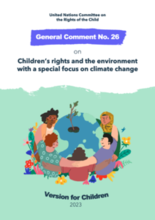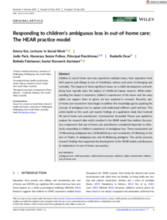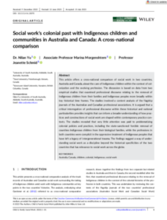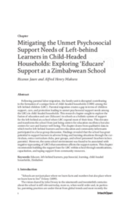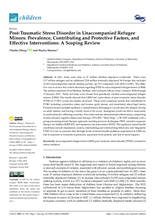Displaying 11 - 20 of 498
In this general comment, the Committee emphasizes the urgent need to address the adverse effects of environmental degradation, with a special focus on climate change, on the enjoyment of children’s rights, and clarifies the obligations of States to address environmental harm and climate change.
This article presents novel findings from interviews with 17 girls and young women and eight Youth Offending Team (YOT) staff, highlighting how being in care in the U.S. can affect offending behaviour and how YOTs may provide support to care-experienced girls who have been inadequately supported elsewhere.
Drawing on the findings of a qualitative study undertaken in the state of New South Wales (NSW), Australia, this article applies the concept of ambiguous loss to outline the ways in which Out of Home Care practitioners can more adequately respond to children's experience of grief and loss.
This article offers a cross-national comparison of social work in two countries, Australia and Canada, about the care of Indigenous children within the context of colonization and the evolving profession.
This paper presents findings from a qualitative study that explored children's and families' experiences of alternative care in Thailand. The study used arts-based methods to engage 160 children living in a range of care settings.
This UK-based paper presents evidence of the importance of screening looked-after children for Adverse Childhood Experiences and demonstrates that the Trauma and Adverse Life Events (TALE) is a valid and reliable tool for this purpose. Adverse and traumatic experiences were highly prevalent in this population and appeared to be closely related with children’s psychosocial wellbeing.
The objective of this webinar was to present the best practices learnt in the implementation of the foster care system as an alternative to limited child care institutions for children on the move in The Gambia.
This exploratory, sequential, mixed-methods study analyses factors that enhance the provision of psychosocial support services and the perceptions of educators towards psychosocial support delivery to orphaned and vulnerable learners in Eswatini.
This research chapter sought to explore the fusion of education and care in schools in Zimbabwe as a holistic system of support for the left-behind at a school where left-behind children expend most of their time.
The objective of this global study was to review the current literature regarding PTSD in unaccompanied refugee minors (URM). The authors concluded that the high levels of mental health problems experienced in URM are due to exposure to traumatic experiences, separation from parents, and lack of social support.

